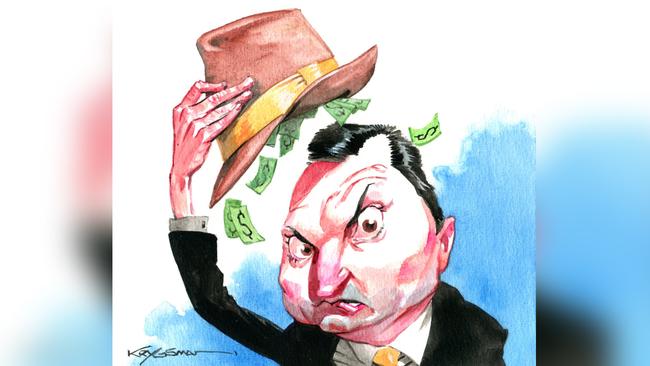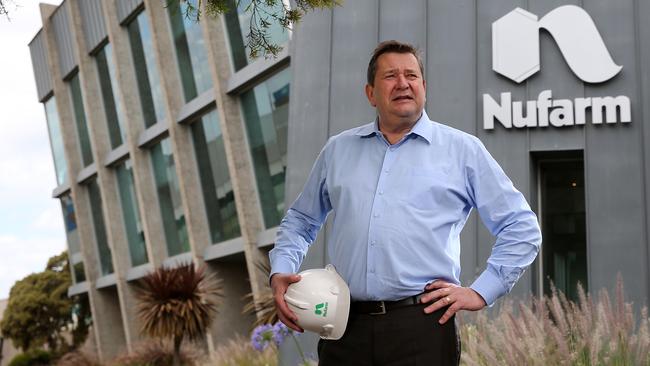Brookfield’s bid for Origin Energy set to fail


Today, his thoughts may be more about just how he can motivate his team for the task of being just a regular $15bn participant in the energy oligopoly, with the Brookfield bid now facing an uphill task.
It is too early to call but the market is saying the bid will fail.
The reality facing Calabria and his chair Scott Perkins is that the game has changed, governments have finally woken up to community pressure and are backing renewables at a time when Origin, like AGL and Energy Australia, is woefully short.
Macquarie analyst Ian Myles figures Origin has become an income-generation machine which should roll on but at the same time put the foot on the renewables accelerator.
This could be through development joint ventures with Brookfield et al, greenfield investments, raising equity for renewable development, demerging et al, but it needs to do something.
Renewables aside, Myles’ base case is the company can no longer get away with paying out between 30 and 50 per cent of free cash flow in dividends and needs to lift that to around 70 per cent, which would distribute unused franking credits and also leave $2bn in spending money.
Brookfield partner EIG has talked up a formal takeover at a lower price if the present proposal fails, which one assumes would not get board support.
For Calabria, a Brookfield takeover would have been a tidy bookend to his seven years as boss and his 22 years at the company, and after a 15-month public takeover campaign many of his team would have been planning what to do with their windfall and their next career move.
Calabria’s major contributions have included cutting debt from $9.1bn to $2.9bn and spending $700m on the superbly timed investment in British renewable-based technology platform Octopus Energy.
He has created a transition platform with 3.5 million customers; now it’s a matter of executing the transition.
If the last year has worn Frank out, his family’s wine empire may look more appealing.
Retail boss Jon Briskin would be the heir apparent, with the new energy head Tony Lucas also a contender.
As things stand the bid will fail, although some wildcards remain, including the 5.3 per cent held in a Morgan Stanley-registered equity swap vehicle, which may just be a regular vehicle for housing hedge fund trades or something more relevant to the takeover bid.
The Bermuda-based bidder Brookfield has waged a public campaign making out it is Australia’s environmental saviour, which presumably means it gets to steal the target.
That of course depends on how you value the target, which it must be said has been extraordinarily diligent in getting shareholders to vote ahead of next week’s meeting. The corporate spin doctors have worked overtime to try to sway the battle towards the Bermudans, having already performed a minor miracle in the snowjob done on ACCC chief Gina Cass-Gottlieb. She took Brookfield’s unenforceable promise to invest in renewables to be a given and somehow equated the motives of the for-profit fund with the public benefit, offsetting the albeit minor competitive hurdle in its ownership of Victoria’s transmission monopoly.
Brookfield has only promised to tell the ACCC when it invests. Notably, as the ACCC has competition concerns, that would be the same as saying Brookfield has pricing power, which usually means higher prices.
Fund managers earn money on performance and size, and Brookfield has used Origin already in its marketing to achieve the latter, while promising 12 to 15 per cent returns.
This puts some context into the chatter this week that AustralianSuper is assuming continued high electricity prices – Brookfield won’t earn the promised returns unless their prices are higher rather than lower.
Fund managers like Perpetual have been less than impressed at the publicity campaigns, but it has been careful not to say which way it will vote next week.
Next week will decide if Calabria gets to fill his pockets with cash or wind the cash-generation behemoth back into gear.
Sowing the seeds
Nufarm’s Greg Hunt is backing his seed technology team to help boost future earnings through higher margin revenue growth.
Omega 3 canola and carinata seed are tipped to grow revenues by $300m to $700m in 2026, earning 20 to 25 per cent margins.
Crop protection revenues will also grow as revenues jump from $2.5bn to $4.6bn but at margins closer to 12 per cent.
Though genetically engineered, the Omega 3 canola seed won approval in Norway this year which puts Europe in sight, while carinata is being planted around the world as a cover crop that both helps cut carbon emissions and boosts soil carbon. In partnership with BP, there’s a key sustainable aviation fuel in the making.

Eco expansion
Queensland’s market-based environmental platform run by Eco-Markets group is widening its network, from issuing water quality credits to help the Great Barrier Reef with cleaner water by reducing sediment to restoring the habitat for cassowaries and using algae to clean waste water.
The Brisbane-based voluntary nature market aims to compensate farmers and traditional owners for improving their land management to help biodiversity.
The independent market started six years ago as a collaboration between the Queensland government, project developer Green Collar, natural resource management group Terrain and NQ Dry Tropics, with help along the way from Pacific Bio’s RegenAqua among others.
The natural resource management regions are established by the federal government but run by the local management.
The market is run by an independent not-for-profit chaired by Jo Sheppard, the head of the Queensland Farmers Federation, and run by Maree Adshead.
In six years more than 44 tonnes of dissolved nitrogen have been prevented from entering the water in the reef, with 44,512 credits issued worth around $60 each or $2.7m in total, and 40,773 retired when sold to corporate investors.
The Burnett Mary Regional Group is a pioneer in measuring biodiversity under principles established by Accounting for Nature and backed in part by Andrew Forrest’s Minderoo.
BMRG is working on the basis that with the baseline formally measured, restoration can be monitored, with credits being sold in the eco market.
Eco-Markets has established the gully method which reduces sediment escaping to the reef through grazing management and revegetation.




Last month, with ACCC clearance, Origin boss Frank Calabria may well have started to imagine just what he was going to do with the $11.4m in incentives plus about $2m retirement pay he would pocket when the Brookfield bid for Origin sailed through.